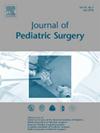加强小儿腹部肿瘤切除手术后的恢复:多机构前瞻性研究
IF 2.4
2区 医学
Q1 PEDIATRICS
引用次数: 0
摘要
背景:术后恢复强化方案(ERAS)是一种多学科的围手术期护理标准化方法。这是首个对接受腹部肿瘤切除术的儿科患者进行ERAS评估的前瞻性多机构研究:2020年至2022年期间在三家儿童医院之一接受腹部肿瘤切除术的所有年龄大于1个月的患者均符合条件。进行ERAS咨询并获得知情同意。各家医院的 ERAS 方案均已标准化。我们利用 16 个变量将前瞻性队列与各机构的倾向匹配历史队列(2014-2020 年)进行了比较。分类变量采用 McNemar 和/或 Stuart-Maxwell 检验进行比较。连续数据采用逻辑回归进行比较:95名患者加入了前瞻性队列,并与95名完全匹配的历史患者进行了比较。历史队列的中位住院日为5.3(4.1-7.2)天,ERAS队列的中位住院日为4.3(3.3-6.2)天(p = 0.053)。ERAS患者的术后阿片类药物消耗量较低,为0.08(0.03-0.16)毫克/千克/天,而历史患者为0.23(0.12-0.52)毫克/千克/天(p = 0.013)。ERAS患者接受清淡饮食(POD#0,0-0)和普通饮食(POD#1,1.0-1.0)的时间提前了两天(均为 p 结论:ERAS方案对儿童患者是可行的:ERAS方案在接受腹部肿瘤切除术的儿科患者中是可行的。使用ERAS方案可大大减少并发症、阿片类药物的消耗、活动时间和饮食时间:证据等级:II。本文章由计算机程序翻译,如有差异,请以英文原文为准。
Enhanced Recovery After Surgery for Pediatric Abdominal Tumor Resections: A Prospective Multi-institution Study
Background
Enhanced recovery after surgery (ERAS) protocols are multi-disciplinary approaches to standardize perioperative care. This is the first prospective, multi-institutional study to evaluate ERAS in pediatric patients undergoing abdominal tumor resections.
Methods
All patients >1-month-old undergoing abdominal tumor resection at one of three children’s hospitals between 2020 and 2022 were eligible. ERAS counseling was performed, and informed consent obtained. The ERAS protocol was standardized across institutions. We compared the prospective cohort to a propensity-matched historical cohort (2014–2020) from each institution utilizing 16 variables. Categorical variables were compared using McNemar’s and/or Stuart–Maxwell testing. Continuous data was compared using logistic regression.
Results
Ninety-five patients enrolled in the prospective cohort and were compared to 95 well-matched historic patients. Median LOS was 5.3 (4.1–7.2) days in the historic cohort, and 4.3 (3.3–6.2) days in the ERAS cohort (p = 0.053). Post-operative opioid consumption was lower in ERAS patients at 0.08 (0.03–0.16) MME mg/kg/day versus 0.23 (0.12–0.52) in historic patients (p = 0.013). ERAS patients received clear (POD#0, 0-0) and regular (POD#1, 1.0–1.0) diets two days sooner (both p < 0.001). ERAS patients ambulated two days sooner (1.0, 1.0–2.0 versus 3.0, 2.0–5.0). The number of patients who experienced any complication was significantly lower in the ERAS cohort (44, 44.2 %) compared to historic (82, 86.3 %, p < 0.001). This reduction was seen across each Clavien-Dindo grade 1–3 category (all p < 0.05).
Conclusion
ERAS protocols are feasible in pediatric patients undergoing abdominal tumor resections. Use of an ERAS protocol significantly reduced complications, opioid consumption, time to mobility, and time to diets.
Level of Evidence
II.
求助全文
通过发布文献求助,成功后即可免费获取论文全文。
去求助
来源期刊
CiteScore
1.10
自引率
12.50%
发文量
569
审稿时长
38 days
期刊介绍:
The journal presents original contributions as well as a complete international abstracts section and other special departments to provide the most current source of information and references in pediatric surgery. The journal is based on the need to improve the surgical care of infants and children, not only through advances in physiology, pathology and surgical techniques, but also by attention to the unique emotional and physical needs of the young patient.

 求助内容:
求助内容: 应助结果提醒方式:
应助结果提醒方式:


